Past events & news from the Robbins Collection
Taming New Mexico
On May 18th, PBS New Mexico will premiere a film documenting the origins of New Mexico’s present-day federal court system, starting with the history of Spanish-Mexican rule of law.
The film will include some images from Robbins Collection holdings, including Recopilación de leyes de los reynos de las Indias (1681).
For more information about Spanish Law in America, please see our digital exhibit on California’s Legal Heritage:
Workshop on “Customary Law Today”
The Robbins Collection and the Institut des Usages (IDU) have organized a workshop for May 18 and 19 to be held in Montpellier, France, moderated by Professors Laurent Mayali and Pierre Mousseron.
Topics to be discussed include private law, civil procedure, philosophy of law, constitutional law, business law, and international law.
Participants will include faculty members from Berkeley School of Law, the University of Montpellier School of Law, and other academic institutions.
Visiting Researcher Workshops
The Robbins Collection hosts monthly workshops for Berkeley Law Visiting Researchers throughout the academic year. These workshops allow participants to present their scholarly research and receive extensive feedback on their work in a small-group setting.
If you are interested in presenting your work or attending a workshop, please contact Andrea Quinn at amquinn@law.berkeley.edu
Robbins Collection and I-School Collaborative Project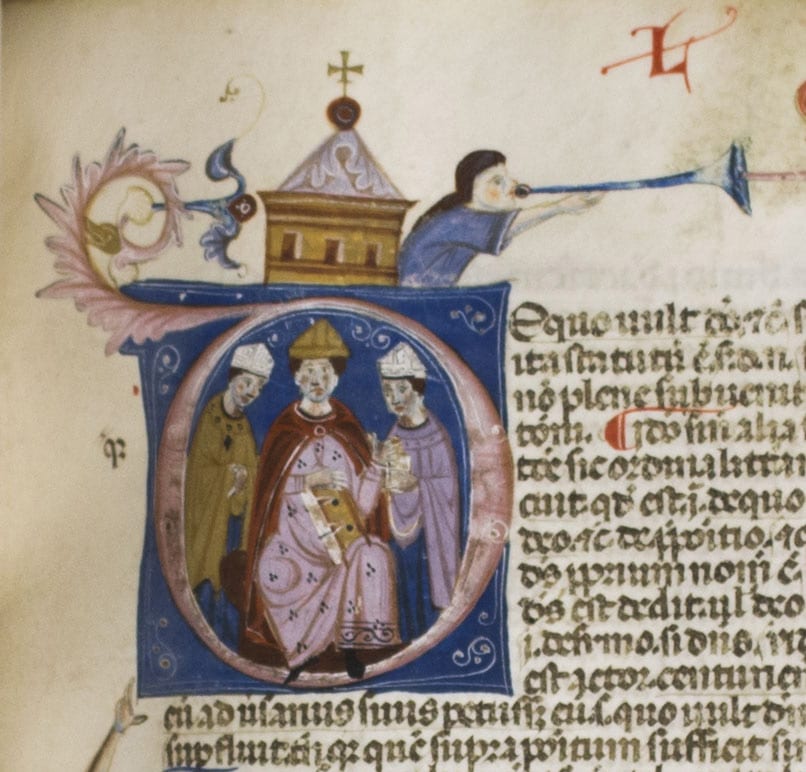
Jordan Shedlock, recent graduate of the I-School’s Master of Information Management and Systems (MIMS) program, has been working on using digital technologies to “improve access to and create excitement around” medieval manuscripts held by the Robbins Collection.
Shedlock’s goal is to create a web interface that will serve as an online destination for the Robbins Collection and allow users to explore its manuscripts. Stay tuned for updates on the project’s launch.
Research Resources
The Robbins Collection will introduce, and continue to add to, a new set of resources for researchers and scholars on our website. These “Resources for Research” will include entries from legal dictionaries and indices, digitized images of Robbins documents and manuscripts, and introductory materials on different legal history topics.
To see the resources that are currently available, click here:
Resources for Research
Festschrift for Professor R. H. Helmholz
The Robbi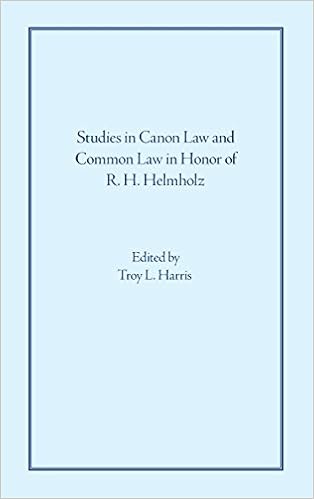 ns Collection is pleased to announce the publication of Studies in Canon Law and Common Law in Honor of R. H. Helmholz, edited by Troy L. Harris.
ns Collection is pleased to announce the publication of Studies in Canon Law and Common Law in Honor of R. H. Helmholz, edited by Troy L. Harris.
Public Talk
Mohammad Fadel, Associate Professor of Law at the University of Toronto, presented “Is Islamic Law ‘Religious’ Law?” on April 4th at 5:00 PM in Boalt 170.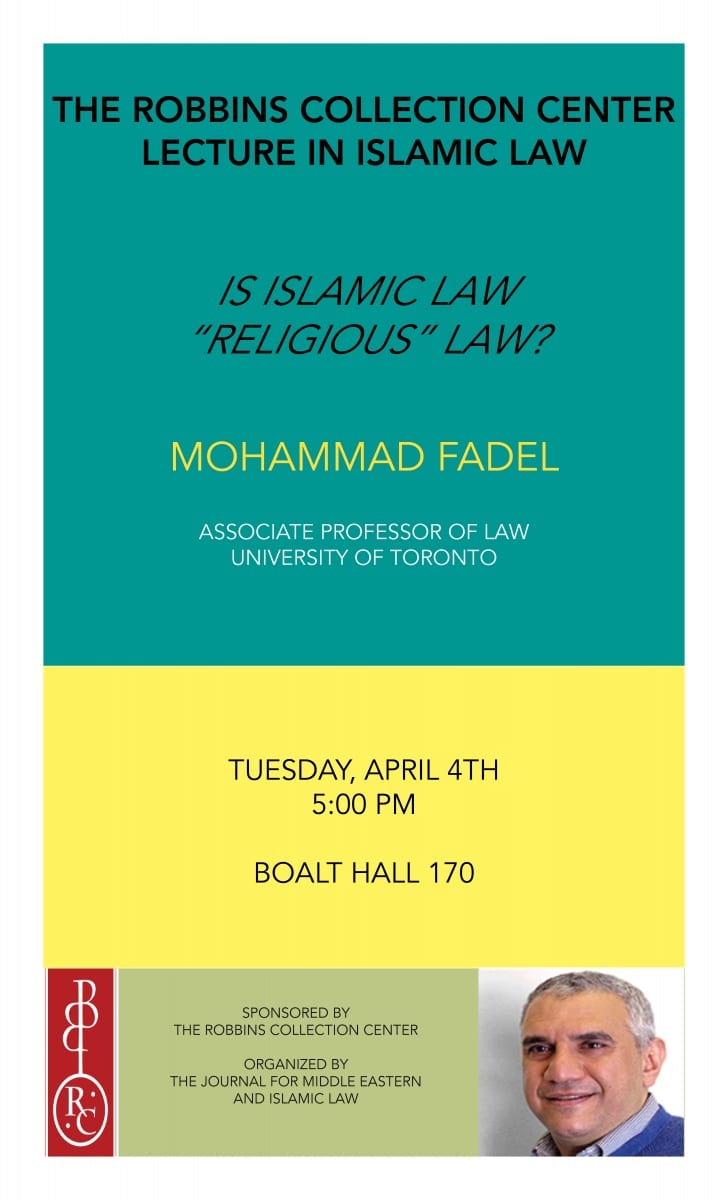 The talk was sponsored by the Robbins Collection and organized by Berkeley School of Law’s Journal of Middle Eastern and Islamic Law.
The talk was sponsored by the Robbins Collection and organized by Berkeley School of Law’s Journal of Middle Eastern and Islamic Law.
Lecture: Medieval Order versus Individualism
Professor Emanuele Conte, from Roma Tre University, spoke at the Legal Studies Program on February 27th about the “Enduring Fascination of German Constitutional History.”
Lecture: Trials in the Middle Ages
Professor Beatrice Pasciuta, from the Università degli Studi di Palermo, spoke at the Legal Studies Program on February 24th about her research on trials in the Middle Ages.
Presentation on International Human Rights
Berkeley Law Visiting Researcher, Pablo Sánchez-Molina, presented his work on international human rights at the Visiting Researcher Workshop on Thursday, February 16th.
The Robbins Collection “Jewish Thought in America Today” Lecture
Arnold Eisen, Chancellor of the Jewish Theological Seminary in New York, spoke on “Jewis h Thought in America Today” on October 27, 2016, at the annual Robbins Collection Lecture.
h Thought in America Today” on October 27, 2016, at the annual Robbins Collection Lecture.
Chancellor Eisen is one of the world’s foremost authorities on American Judaism. He has written several books and articles on a range of topics, including Jewish community and scholarship. Chancellor Eisen’s lecture was sponsored by the Robbins Collection and the Berkeley Institute for Jewish Law and Israel Studies.
Current Legal Issues in Taiwan and the United States
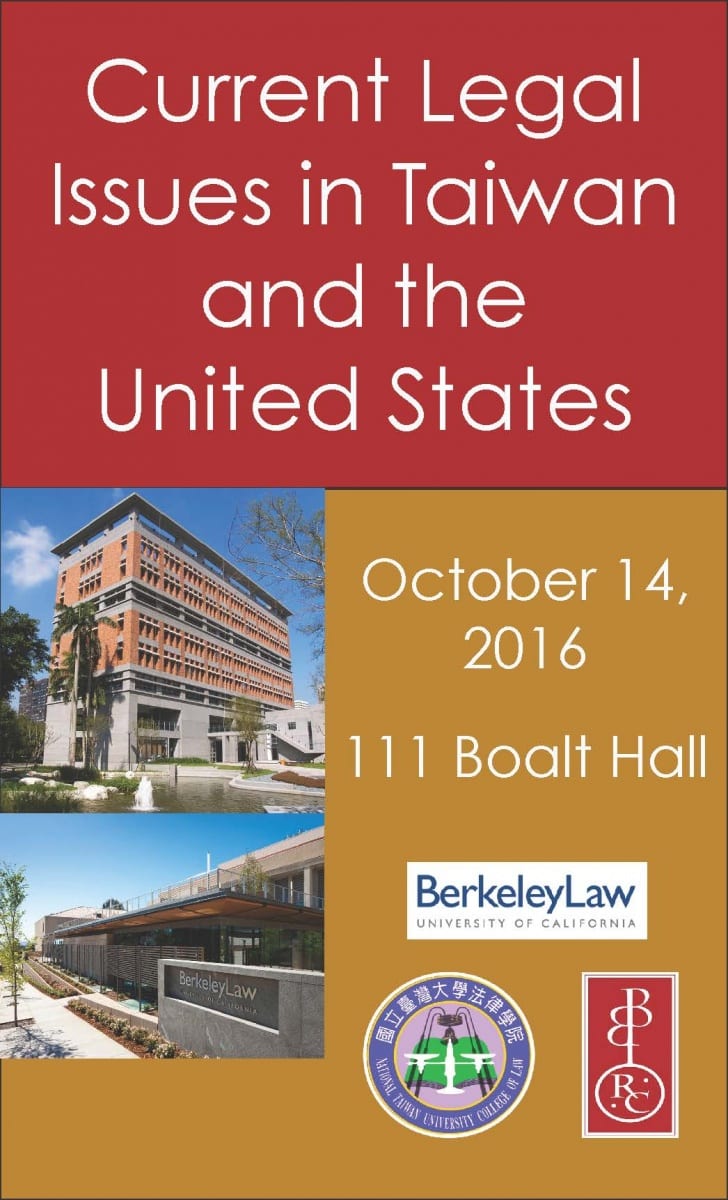 On October 14, 2016, the Robbins Collection was pleased to host a one-day conference on topics that included corporate law and insider trading, courts in civil disputes and multidistrict litigation, and surrogate decision-making regimes and drug price regulation.
On October 14, 2016, the Robbins Collection was pleased to host a one-day conference on topics that included corporate law and insider trading, courts in civil disputes and multidistrict litigation, and surrogate decision-making regimes and drug price regulation.
Workshop participants included Professors from National Taiwan University’s College of Law, Hofstra University School of Law, Berkeley School of Law as well as a High Court Judge from the Taiwan Intellectual Property Court.
Article on Justice and Politics in Colombia
Robbins Collection Post-Doctoral Fellow on the Legacy of Civil Law in Latin America, Pablo Echeverri, recently published an online commentary in eltiempo:
De la justicia, la política y la politiquería
Jews and Judaism in France Today
On April 13, 2015, Grand Rabbin d’Aix en Provence, Daniel Dahan, spoke about the current status of Jews and Judaism in France. The lecture was sponsored by the Robbins Collection and the Berkeley Institute for Jewish Law and Israel Studies. Rabbi Dahan is the author of Agounot: Les Femmes Entravées.
Workshop on Religious Law

On February 21, 2014, the Robbins Collection hosted a one-day workshop at Berkeley School of Law titled “Implementing Religious Law in Contemporary Nation-States: Definitions and Challenges.” Berkeley School of Law’s Acting Dean, Gillian Lester, welcomed the group, which included practicing attorneys and scholars with expertise in Jewish, Catholic, and Islamic legal traditions.
The workshop, which was organized and moderated by Robbins Collection Director Laurent Mayali and Robbins Postdoctoral Fellow, Lena Salaymeh, provided a forum for international legal experts and scholars to present their papers and debate a variety of important topics at the intersection of law and religion. Scholars from the University of Florida, University of Toronto, Villanova University, Indiana University, University of London (Birkbeck), Kramer Levin LLP, Hebrew University, Qatar Faculty of Islamic Studies, the University of Pennsylvania, the University of Utah, and Saint Joseph University (Beirut) offered competing viewpoints on the role of the state in implementing “religious laws,” and they discussed case studies from Israel, the Arab world, and the United States.
Legal Commentaries Exhibit

On January 30, 2014, the Robbins Collection unveiled a new, three-day exhibit showcasing legal commentaries on, each, canon law, Jewish law, and Islamic law.
Among the eye-catching and significant works displayed from the Robbins Collection of rare books were Clementinae constitutions, Kitāb al-wiqāyah, and Talmud Bavli.
2012 Robbins Collection Lecture
The 2012-2013 Robbins Collection Lecture Cebter in Jewish Law and Thought, co-sponsored with Berkeley Law’s Institute for Jewish Law and Israeli Law, Economy, and Society, took place on Monday, November 26, 2012.
Chief Rabbi Lord Jonathan Sacks presented “The Future of Judaism.”
Legal Heterodoxy in Islamic and Jewish History: Late Antique and Medieval Transformations
 April 23-24, 2012
April 23-24, 2012
This two day symposium examined the place of multiple and dissenting legal opinions in Jewish and Islamic legal history, focusing on the late antique and medieval periods (from approximately 300 to 1300 CE) in the Near East. Recognizing that the story of Jewish law and the story of Islamic law cannot be told in isolation, these panels explored the transformation of legal systems within a comparative framework in order to more clearly distinguish between genuine parallels and unique divergences.
The significance of this symposium was in its emphasis on a deeper awareness of the cross-pollination and shared relationships that Jewish and Islamic legal traditions perpetuate.
2012 Robbins Collection Lecture in Jewish Law
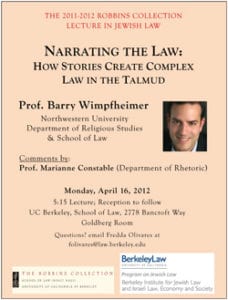 Narrating the Law: How Stories Create Complex Law in the Talmud
Narrating the Law: How Stories Create Complex Law in the Talmud
Professor Barry Wimpfheimer
Department of Religious Studies and School of Law,
Northwestern University
April 16, 2012
University of California, Berkeley, School of Law
The Robbins Collection, in affiliation with the Berkeley Program on Jewish Law, presented the third annual Robbins Collection Lecture in Jewish Law at Berkeley Law.
Islamic Law and Society Spring 2011 Lecture Series
The Robbins Collection presented three lectures as part of its annual Islamic Law and Society lecture series. Topics included the representation of Muslims emerging from the Park 51 / “Ground Zero mosque” controversy, personal status law in Egypt’s Coptic Christian community, and constitutionalism and democratic governance in Islamic jurisprudence in Iran. This lecture series was co-sponsored with the Berkeley Journal of Middle Eastern & Islamic Law (JMEIL).
Daube Colloquium 2008
Collected Works of David Daube Volume Two: New Testament Judaism and Volume Three: Biblical Law and Literature
September 13, 2008
Robbins Collection, University of California, Berkeley, School of Law
Fostering exploration by a new generation of scholars on the work of world-renowned religious and Roman law scholar and former Boalt professor David Daube, the Robbins Collection hosted its first Daube Colloquium in September 2008. Led by Calum Carmichael, Professor of Comparative Literature and Adjunct Professor of Law at Cornell and editor of the Robbins Collection publication series, Collected Works of David Daube and Professor of Law and Robbins Collection Director Laurent Mayali, the colloquium brought an international group of experts from diverse fields of law, history and the humanities to examine and discuss Daube’s scholarly legacy and issues he raised in religious law writings from in series Volume Two, New Testament Judaism (2001) and Volume Three, Biblical Law and Literature (2003).
Scholar Series on Islamic Law and Society: 2008 Lecture Series
Who Says Shari’a Demands the Stoning of Women?: A Commentary on Islamic Law and Constitutionalism
Asifa Quraishi, Assistant Professor of Law, University of Wisconsin-Madison
March 18, 2008
University of California, Berkeley, School of Law
Islamic Legal Histories: Towards a New Research Agenda Based on Sodomy Law?
Amr Shalankany, Asst. Professor of Law, American University on Cairo
April 1, 20081
University of California, Berkeley, School of Law
Iraq History Project: Personal Narratives on Political Violence Before and After the US Invasion
Etelle Higonnet, Analysis Director of the Iraq History Project
October 10, 2008
University of California, Berkeley, School of Law
The Robbins Collection presented these lectures as part of its annual Islamic Law and Society lecture series co-sponsored with the Berkeley Journal of Middle Eastern & Islamic Law (JMEIL).
Dalhuisen gift to the Robbins Collection
The Robbins Collection at the School of Law received a generous donation of rare books from a distinguished legal scholar to add to its permanent collection. The gift comprises nearly 80 volumes, most of them dating from the sixteenth through eighteenth centuries, from the collection of Professor J. E. Scholtens (1902-1991) and donated by his daughter, Mrs. Elizabeth J. S. Scholtens Dalhuisen. Mrs. Dalhuisen shares a long connection to the School of Law with her husband, Professor Jan Dalhuisen, an expert in International Commercial, Financial, Insolvency and Arbitration Law who received an LL.M. degree from Boalt in 1967 and has returned frequently as a Visiting Professor.
Professor Scholtens earned a doctorate in law in Amsterdam and taught Roman-Dutch law at Utrecht from 1946-1949. In 1949 he accepted the chair in Roman-Dutch law at the University of the Witwatersrand in Johannesburg, South Africa, where he taught until 1972. Centering on the subject of Professor Scholtens’s life work, the volumes donated to the Robbins Collection in his honor are a wonderful complement to the Collection’s existing holdings in Roman-Dutch jurisprudence.
The development of the Roman-Dutch legal tradition was an important stepping stone in the early modern evolution of Western civil law systems from medieval Roman law scholarship. Influenced by French Humanism and the post-Reformation political and cultural transformation of Europe, Roman-Dutch law became foundational not only to modern legal practice in the Netherlands and its neighbors but, through Dutch colonial influence, to South Africa as well. For more about the Roman-Dutch legal tradition, please see our exhibit page.
Water Rights and Governance in Sub-Saharan Africa
Roundtable Meeting
Sponsored by the Robbins Collection and the Institute for Global Challenges and the Law
UC Berkeley School of Law
On March 13, 2008, the Robbins Collection and the Institute for Global Challenges and the Law welcomed experts from Senegal and France to a roundtable meeting on water rights and governance in sub-Saharan Africa. After opening remarks from Dean Edley and Professor and Robbins Collection Director Laurent Mayali, Professors Mamadou Badji, Moustapha Ngaidé, and Samba Thiam from Université Cheikh Anta Diop, Dakar, and Professor Bernard Durand from Université Montpellier I, Montpellier, offered perspectives on legal tradition and current models of water rights in Senegal, with Boalt student Hana Ivanhoe presenting additional analysis of international norms.
Roundtable discussion followed, with Boalt professors Joseph Sax, Howard Shelanski, Rick Frank and Cymie Payne of the California Center for Environmental Law and Policy, and Dan McGrath, Executive Director of the Berkeley Institute of the Environment, contributing to a broader examination of current challenges in global water rights governance. This first encounter paves the way for future research and collaboration on legal and policy issues in sub-Saharan Africa as part of Boalt’s ongoing efforts to examine global issues in comparative and interdisciplinary contexts.
Norm, Knowledge, and Text in Medieval Culture and Legal Tradition
September 17–20, 2006
Asilomar conference center, Pacific Grove, CA
Historians and legal historians of the middle ages convened at Asilomar conference center in September 2006 for this two-day conference organized by the Robbins Collection. The meeting included medievalist experts from universities across the United States as well as France, Germany, Italy, Japan, and Spain, bringing together scholars who share a common interest in interdisciplinary approaches to the study of law, philosophy and theology in medieval culture. Papers and discussion incorporated diverse aspects of medieval knowledge, bringing a variety of themes and approaches to the table and exploring possibilities for furthering comparative and interdisciplinary scholarship in the field. Issues examined included sanctuary, sacred space and architecture; sacrilege and between law and theology; cultural and logical bases of truth in medieval judicial systems, prudentia and ethics in late medieval jurisprudence; the body as text; theology, dispensation and normative power; law, rights, and sexual identity; and civil death and legal rules.
Corpus Scriptorum Iuris Romani
July 16–21, 2006
Robbins Collection, University of California, Berkeley, School of Law
A group of international specialists in Roman law and Greek and Latin philology met at the Robbins Collection to initiate a critical edition of Roman legal texts based on the fundamental work of renowned Roman law scholar Otto Lenel. Lenel’s Palingenesia laid the groundwork for generations of modern scholars, serving as a fundamental text not only for Roman law studies but also for the history of legal thought in civil law countries.
The Corpus Scriptorum Iuris Romani project was devloped by the Istituto Italiano di Scienze Umane in collaboration with more than a dozen European universities in Italy, Germany, Spain and France. Led by Aldo Schiavone, Professor of Law and Director of the IISU in Florence, the editorial team for the Corpus Scriptorum Iuris Romani project includes Roman law specialists from universities in Florence, Rome, Pavia, Trent, Parma, Lecce, Bologna, Siena, Cagliari, Naples, Cassino, Heidelberg, and Paris, all of whom convened in Berkeley to participate in a weeklong meeting organized by Professor Schiavone and Laurent Mayali, Professor of Law and Director of the Robbins Collection at the University of California, Berkeley.
The aim of the Corpus Scriptorum Iuris Romani project is to produce a series of volumes for publication during the next decade. Each volume will focus on one or more of the Roman jurists and include an introduction to his career and work, a reconstitution of the existing fragments of his writings, and a modern Italian translation of these passages from Latin, annotated for the reader.
The Robbins Collection, with a rare and modern Roman law collection ranked as one of the best in the world, was a venue uniquely suited to host the beginnings of this ambitious project. The opportunity to collaborate with this prestigious team of legal scholars on the Corpus Scriptorum Iuris Romaniunderscores the ongoing global impact of the scholarship that takes place at Berkeley Law and the Robbins Collection. This meeting also honored the legacy of Professor David Daube, one of Berkeley Law’s greatest teachers, who, as a young student in Freiburg, began his studies of Roman law with Otto Lenel.
Martin Guerre working group
January 2005: The Robbins Collection co-sponsored a working group for K–12 teachers with UC’s Office of Resources for International and Area Studies (ORIAS), the Bay Area Global Education Program (BAGEP) at the World Affairs Council of Northern California. This year’s ORIAS working group series was entitled Constructing Identities: Comparative Short Fiction From the Arab World, East Asia and Western Europe, and as part of this series, Julianne Gilland (Robbins Collection) and Michele Delattre (ORIAS) organized a one-day workshop at Boalt Hall in January.
The workshop focused on the Martin Guerre trial, a 16th-century case of identity theft in France that has inspired plays, fiction, films and legal commentaries for over 500 years. In a special session at the Robbins Collection, Bay Area K-12 teachers participated in a one-day meeting to discuss the case and the issues of law, identity, and community that it brought together, using Natalie Zemon Davis’s historical reconstruction, The Return of Martin Guerre.
During the session, the group also had an opportunity to see an original edition of Judge Jean de Coras’s legal commentary on the trial and examine other relevant 17th-century legal texts from the Robbins Collection’s holdings. The event was a great opportunity for the teachers to get some hands-on experience with using archival documents in a classroom setting and to think in new ways about how we and our students consider the role of law in our society.
Current Issues and New Perspectives in Latin American Law: Robbins Collection Lectures in Political Culture and Legal Tradition Series
The Jurisdiction of Peru’s Constitutional Court
Justice Delia Revoredo Marsano, Constitutional Court of Peru
(Formerly Civil Law Professor at the Catholic University)
January 24, 2005
University of California, Berkeley, School of Law
Recent Developments in Brazilian Public Law
Justice Joaquim Benedito Barbosa Gomes, Supreme Court of Brazil
(Formerly Law Professor at the State University of Rio de Janeiro)
February 8, 2005
University of California, Berkeley, School of Law
Constitutional Actions in Mexico
Justice José Ramón Cossío Díaz, Supreme Court of Mexico
February 25, 2005
University of California, Berkeley, School of Law
The Duty to Obey the Law in Argentina and Latin America
Professor Carlos Rosenkrantz, University of Buenos Aires; Palermo University in Buenos Aires
April 4, 2005
University of California, Berkeley, School of Law
As part of the Robbins Collection Lectures in Political Culture and Legal Tradition, a series of lectures by distinguished scholars of comparative and international law and legal history, the Robbins Collection invited an illustrious roster of speakers to Berkeley Law during the Spring 2005 semester, highlighting current issues and new perspectives in Latin American law: Peruvian Supreme Court Justice Delia Revoredo, Brazilian Supreme Court Justice Joaquim Barbosa Gomes, Mexican Supreme Court Justice José Ramón Cossío Díaz, and Professor Carlos Rosenkrantz, former advisor to Argentinean President Raúl Alfonsín. Sponsored in cooperation with the Center for Latin American Studies, this special series provided the law school and campus communities with a unique opportunity to discuss firsthand with judicial and legal authorities of Latin America some of the most pressing issues of justice, society and constitutionalism facing their countries today.
Curs de Dret Xinès
October 29, 2004
Barcelona, Spain
In collaboration with the Robbins Collection and the Universitat Autònoma de Barcelona, the Casa de Asia center in Barcelona sponsored a seminar on various aspects of Chinese law presented by Asian law experts and members of the Berkeley Law community, and attended by professionals from Barcelona’s legal and business communities. Participants invited by the Robbins Collection included Junfeng Wang, founding partner of international law firm King & Wood, and Berkeley Law scholars Professor Stanley Lubman, Professor Jiayan Li, and researcher Lei Zhu. The papers they presented were as follows:
Stanley Lubman ,”China’s Legal Reforms after Mao: Accomplishments and Future Prospects”
Junfeng Wang, “Intellectual Property Protection and Remittance of Profit”
Jiayan Li, “The Reform of Securities Law in China”
Lei Zhu, “Corporate Governance and State-Owned Companies in China”
Empire and World Order
April 22–23, 2004
Florence, Italy
The processes of globalization and technological innovation opened a new chapter in the history of mankind. The resulting transformation increasingly has become intertwined with the emergence of the United States as the center of a new international order, presenting enormous political, legal, ethical, and cultural concerns. In order to explore these issues from different national perspectives, and contribute to the further development of a dialogue between the United States and Europe, the Istituto Italiano di Scienze Umane, Florence and Naples, and the Robbins Collection co-organized Empire and World Order, a conference bringing together a select group of high-level government officials and scholars from the United States with distinguished scholars from Italy, France, Germany, Great Britain, and Spain. Program sessions were conducted as panel discussions on topics including “Law and the Use of Force,” “Convergence and Divergence of World Cultures” and “New World Order and the Future of the Nation-State.” Events concluded with a plenary session before a larger audience of invited guests and select members of the press.
Mexico and the United States: From Economic to Legal Partnership
February 13–14, 2004
University of California, Berkeley, School of Law
Organized by the Robbins Collection and the Berkeley Center for Law, Business and Economics, this conference brought together judges, government officials and scholars from Mexico and the United States to explore the ways in which the relationship between these countries has been marked by new and distinct forms of collaboration as it has evolved in recent decades. The emergence of new markets, the expansion of innovative technologies, and constant demographic shifts have forced both nations to reconsider the national and international parameters of their economic and legal partnership. Trade and monetary exchanges represent only one facet of this relationship; the diverse forms in which exchanges between our two countries take place create a model of transnational cooperation where economic and cultural factors are frequently intertwined. This negotiation between economy and culture presents new legal challenges as we continue to refine the terms of partnership between Mexico and the United States.
Conference sessions centered upon NAFTA, law and economic development, and special problems of immigration and culture. The conference concluded with a keynote address by honored guest and participant Dr. Ernesto Zedillo, Former President of Mexico and Professor in the Field of International Economics and Politics and Director and Yale Center for the Study of Globalization.
The End of the Past: Seminar with Aldo Schiavone, Professor, Università degli Studi di Firenze; Director, Istituto Italiano di Scienze Umane
September 27, 2003
Robbins Collection, University of California, Berkeley, School of Law
Aldo Schiavone’s book The End of The Past raises challenging questions not only for scholars of ancient history but for modern historians and legal historians as well. The publication of the English translation of this work provides an excellent opportunity to focus scholarly attention from across disciplines on the role of history and the law in the development of western culture. With this goal in mind, the Robbins Collection organized a seminar around the book led by Professor Schiavone and Professor Glen Bowersock, Institute for Advanced Study, Princeton. The seminar brought together distinguished scholars from multiple fields of expertise to participate in an interdisciplinary forum on law, history and culture in western society.
Judicial Power and the Rule of Law: Comparative Perspectives
September 12–14, 2002
Robbins Collection, University of California, Berkeley, School of Law
Building on the success of its 2001 international judges’ conference on the function and role of judicial power in current political systems, the Robbins Collection organized a second international meeting of judges in Berkeley in September 2002 to discuss current challenges to the political traditions of modern states and paradigm shifts in political and legal culture. Bringing together several of the highest-ranking judicial officials from different nations to share their experience and perspectives on the evolving contexts and functions of the judiciary in a series of panels and informal discussions, this year’s meeting expanded the global scope of the conversation with participating judges from China, France, Germany, Netherlands, and the United States.
Judicial Power and the Rule of Law: Visiones Comparadas
June 7–10, 2001
Barcelona and Sitges, Spain
To explore the relationship between the theory and practice of judicial power in a comparative context, the Robbins Collection, in conjunction with the Universitat Autònoma de Barcelona, Spain, and the Unité Mixte de Recherches CNRS “Dynamiques du Droit,” Université Montpellier I, France, hosted a conference in June 2001 that brought together preeminent judicial officials and legal scholars from France, Germany, Portugal, Spain, and the United States to examine new challenges facing modern states and their political traditions. At a time when democracy is everywhere accepted as a prevailing model of government, its foundations have become more vulnerable. As the legitimacy of the political system is questioned, justice and legality are relied upon more than ever as the guarantors of the social order, marking a departure from the threats that have traditionally undermined the historical evolution of democratic societies, and revealing a paradigm shift in political and legal culture.
The panel discussions and papers reflected the diversity of political, social and cultural roles that the judicial system plays in contemporary democratic nations and highlighted the most current and controversial issues facing their countries. Complementing the judges’ discussions of judicial power in practice, the panels comprised of law professors and legal historians centered on theoretical examinations of both the historical foundations and the current functions of judicial power in political systems.
